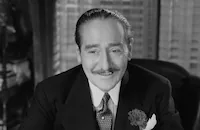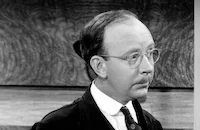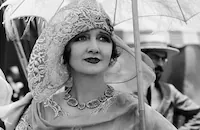That's Right--You're Wrong

Brief Synopsis
Cast & Crew
David Butler
Kay Kyser
Adolphe Menjou
May Robson
Lucille Ball
Dennis O'keefe
Film Details
Technical Specs

Synopsis
When a big Hollywood studio begins to see their box office revenues slipping, studio head J. D. Forbes demands some down-to-earth yarns to fill the studio's coffers. For his campaign, Forbes recruits popular radio personality Kay Kyser and his band to come out to Hollywood. At first reluctant, Kay capitulates to the wishes of the band and accepts the studio's offer. Shepherded by manager Chuck Deems, the band arrives on the Coast, where they are greeted by producer Stacey Delmore. Problems arise, however, as the members "go Hollywood" and Kay's homespun image clashes with the romantic leading man role that screenwriters Tom Village and Dwight Cook have written for him. After the writers become deadlocked, Stacey decides to trick Kay into breaking his contract by replacing band singer Ginny Simms with leading lady Sandra Sands. Taking the advice of Village and Cook, Kay calls Stacey's bluff and accepts the role of Sandra's Latin lover. At a press party, he appears in flamboyant Chinese pajamas and announces that he is eager to play the role of the handsome Venetian gondolier who passionately loves Sandra. Kay's preposterous casting makes Stacey the laughing stock of the industry, prompting the producer to cancel the picture and pay off Kay's contract. Meanwhile, the band, convinced that Kay has lost his mind, has him kidnapped and returned home to their radio station in Rocky Mountain, North Carolina, where they all agree they belong.

Director
David Butler
Cast

Kay Kyser

Adolphe Menjou

May Robson

Lucille Ball

Dennis O'keefe

Edward Everett Horton
Roscoe Karns

Moroni Olsen

Hobart Cavanaugh

Ginny Simms
Harry Babbitt
Sully Mason
Ish Kabibble
Dorothy Lovett
Lillian West
Dennis Tankard
Jane Goude
Kathryn Adams
Effie Parnell
Charles Doehrer
Sheila Graham

Hedda Hopper
Erskine Johnson
Jimmy Starr
Feg Murray
Fred Orthman
Crew
Jerome Brainin
David Butler
David Butler
Carroll Clark
William Conselman
William Conselman
Walter Donaldson
George Duning
Fred A. Fleck
Dave Franklin
Sam H. Stept
Hy Heath
James V. Kern
James V. Kern
Johnny Lange
Russell Metty
Irene Morra
Charles Newman
Van Nest Polglase
Lew Porter
Eddie Prinz
Allan Roberts
Darrell Silvera
Edward Stevenson
Vernon L. Walker
Earl A. Wolcott

Film Details
Technical Specs

Articles
That's Right, You're Wrong - That's Right - You're Wrong
The North Carolina native, son of two pharmacists (his mother was a pioneer in the field), attended UNC and was a cheerleader for the school, quickly becoming a popular attraction and a campus favorite. His effortless knack for entertaining others caught the eye of fellow students who were starting up a dance band and he was asked to join. Instead of taking up a musical instrument, he took his place as the emcee, rousing audiences with his hilarious banter and infectious exuberance. Kyser eventually took over the reigns of the band and also met longtime friend and collaborator George Duning, who would go on to a long Hollywood musical career as the composer of scores from films such as Picnic (1955) and From Here to Eternity (1953). Kyser developed a unique format for his band, a combination of music, comedy and audience participation, and they kicked around for several years, slowly earning a reputation.
Kay Kyser eventually found success in Chicago. An engagement at a popular restaurant brought him local recognition, frequent radio appearances, and eventually a new recording contract. Kyser, along with his troupe which included memorably-nicknamed trumpeter Ish Kabibble, female singer Ginny Simms, and male vocalist Harry Babbitt, soon became a musical and comedy sensation with their radio show Kay Kyser's Kampus Klass. The Klass eventually evolved into the Kollege of Musical Knowledge, Kyser's incredibly popular show which quickly outgrew its Chicago roots and by 1937 was broadcasting out of New York for cigarette advertiser Lucky Strike.
Kay Kyser's radio success and personal charm made his transition into the film industry inevitable. The entire band was brought out to Hollywood by RKO Studios in 1939 to star in That's Right, You're Wrong, named for one of Kyser's trademark sayings on his radio show. A snappy satire on the movie business, That's Right, You're Wrong starred Kay Kyser as himself, the bandleader star of a successful radio show, who's brought to Hollywood only to find out that the writers can't come up with a suitable project for him. He's shoehorned into a part intended for a romantic lead actor, and of course much hilarity ensues as the ebullient Kyser has fun trying to fit into life on and off the silver screen.
David Butler, the director of That's Right, You're Wrong, came from a long and successful career as an actor in silent movies, who eventually moved into writing, producing and directing. Skilled in working with music and comedy, his directorial efforts prior to That's Right, You're Wrong included the 1930 science fiction comedy Just Imagine, starring Swedish dialect comedian El Brendel, Will Roger's version of A Connecticut Yankee (1931), the Shirley Temple hits Bright Eyes (1934), The Little Colonel (1935), and Captain January (1936), Eddie Cantor in Ali Baba Goes to Town (1937), The Ritz Brothers in Kentucky Moonshine (1938), and nearly forty others. (He would go on to direct another fifty features before retiring in the late 1960s.)
Veteran actor Adolphe Menjou, playing fictitious studio head Stacey Delmore, had been in movies since 1914, with a short break for military service in World War I. After his matinee-idol phase he became a reliable character actor, eventually amassing nearly two hundred appearances over his nearly fifty-year screen career. Lucille Ball, who was to receive her biggest accolades for her later television career, co-starred as aspiring movie siren Sandra Sand, whose career rise is hilariously threatened by Kay Kyser's insistence on appearing as her leading man.
Omnipresent character actor Dennis O'Keefe also co-starred as Kay's manager who masterminds the band's stab at Hollywood stardom. Other Hollywood character actors also appeared in That's Right, You're Wrong, such as the redoubtable May Robson, nearly eighty years old at the time of her appearance here. She had enjoyed a major film career with roles in A-level productions such as Frank Capra's Lady for a Day (1933, as Apple Annie), Anna Karenina (1935), A Star Is Born (1937), Bringing Up Baby (1938) and many more.
Hollywood historians would do well to watch closely the sequences where Kay Kyser meets the press. Real-life Hollywood gossip columnists Hedda Hopper, Sheilah Graham, Erskine Johnson, Jimmy Starr (who also wrote several movies), Feg Murray (a cartoonist who created the "Seein' Stars" newspaper series based on tinsel town doings) and Fred Orthman appeared uncredited in those scenes.
Audiences looking for the Kay Kyser music they loved weren't disappointed with That's Right, You're Wrong, which featured six tunes performed by Kay and the band, along with a sequence of Kyser's Kollege of Musical Knowledge with the maestro doing what he did so well. Critics also were not disappointed with That's Right, You're Wrong, even though they may have expected the worst since the number of bandleaders who made a successful transition to other mediums were fairly thin. Nevertheless, reviewers were full of praise for Kyser's ingratiating performance and the clever script which gave him ample opportunity to show off his comic chops. "...the maestro displays comedy ability far above the ordinary for screen newcomers" cooed Variety. The New York Times called it a "double-edge satire" on Hollywood, and liked Kay Kyser's transition to film.
RKO studio executives liked That's Right, You're Wrong too and cast Kay Kyser and his band in six more features, the last one in 1944. When WW II broke out, Kyser fulfilled his current contracts but then devoted the rest of his time to performing for the troops. He also helped found the famous Hollywood Canteen for visiting West Coast soldiers. Even after the War, Kyser continued to concentrate on philanthropic appearances, and it was at this time that a bout with arthritis caused him to become an adherent of Christian Science. In 1948 Kay was persuaded to return to full-time performing as he accepted the offer to transfer his radio show to television. After only two years it was cancelled -- supposedly Mrs. Henry Ford, wife of the head of Ford Motor Company, Kyser's sponsor, didn't enjoy the program -- and Kay Kyser finally was able to retire for good. He more or less devoted his life to Christian Science, becoming a practitioner, lecturer and Church executive, and in 1983 he was elected president.
In 1985 Kyser died of a heart attack in his beloved North Carolina. His name may not be familiar now to anyone but movie buffs and big band aficionados but after watching That's Right, You're Wrong, it's hard to deny that Kay Kyser was a tremendous entertainment personality who left a great legacy of laughter and song for us to rediscover.
Producer: David Butler
Director: David Butler
Screenplay: William Conselman (and story), James V. Kern; David Butler (story)
Cinematography: Russell Metty
Art Direction: Van Nest Polglase
Music: George Duning (uncredited)
Film Editing: Irene Morra
Cast: Kay Kyser (Kay Kyser), Adolphe Menjou (Stacey Delmore), May Robson (Grandma), Lucille Ball (Sandra Sand), Dennis O'Keefe (Chuck Deems), Edward Everett Horton (Tom Village), Roscoe Karns (Mal Stamp), Moroni Olsen (Jonathan 'J.D.' Forbes)
BW-94m. Closed captioning.
by Lisa Mateas

That's Right, You're Wrong - That's Right - You're Wrong
Quotes
Trivia
Notes
This picture marked the film debut of radio personality Kay Kyser and his band. The opening credits of the film read "with Kay Kyser's Band featuring Ginny Simms, Harry Babbitt, Sully Mason, Ish Kabibble and The College of Musical Knowledge." The Variety review notes that columnists Shelia Graham, Hedda Hopper, Erskine Johnson, Jimmy Starr, Feg Murray and Fred Orthman make guest appearances in the press sequence of this picture. Modern sources claim that the writers in this picture were modeled after RKO's Gene Towne and Graham Baker. The team of producer-director David Butler, editor Irene Morra and writer William Conselman all worked together on the 1939 Universal film East Side of Heaven.















